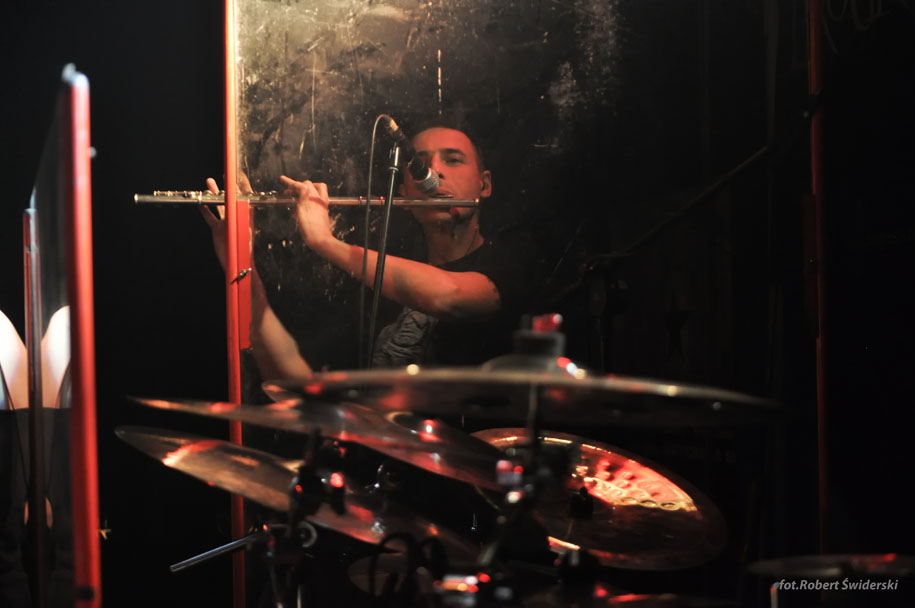
Quite simplistic at face value, the whole song is carried by Kossowicz' vocal melody, but the addition of electronic beats and Hammond organ take the song on a different level. While a distinct neo-prog influence pervades the composition, the band also utilizes plenty of jazz-inflected bass figures and folky flute work. The epic-scaled "Depicting Colours of Emotions" not only breaks the ten-minute mark but also cements the fact that Quidam have now returned to the more symphonic rock sound that characterized their earlier body of work. The song also benefits from zither sounds before Maciek Meller lays down an emotional guitar solo that builds up to a wonderful melody at the end.

It deftly segues into the neo-proggy "Kinds of Solitude at Night", driven by a multitude of elements: lush synths lending themselves to more modern soundscapes, Gilmour-like guitars, female backing harmonies courtesy of Emila Nazaruk, and a great vocal melody. "Different" sets the mood of the CD with a beautiful piano melody complemented by a gorgeous flute arrangement and acoustic guitars. While the contrast of light and dark is still expanded on, they have chosen to apply this to a more song-based format this time, rather than displaying it in the same compositions. Rather, the band opt for a more symphonic prog rock vibe, which is achieved through a blend of great acoustic guitars, warm synth tones, emotive vocals, and the inclusion of flutes among other instruments. Musically speaking, it strays significantly from their previous work in that it avoids the Porcupine Tree references that heavily permeated SurREvival. Yes, Alone Together, Quidam's second album with vocalist Bartek Kossowicz, is a concept album examining the inner turmoils and estrangement of the individual. they are there to remind us of illusions we lost. The song titles of Alone Together ingeniously form one sentence: Different kinds of solitude at night depicting colours of emotions. Posted by Murat Batmaz, SoT Staff Writer on 04:43:51 The codicil to the album sees the band rock out somewhat with the chance for the drummer to really hit the damn things.Ī well crafted album which will undoubtedly appeal to all lovers of melodic symphonic prog. "One day we find" packs a lot of changes in pace into its mainly instrumental content whilst the title track of the main work is a tender acoustically accompanied ballad. I'm reminded again very much of Satellite or Collage here with polished (no pun intended) singing from Bartek and crisp clean extended guitar licks raising the tempo at the end and finding room for a sax to rough things up a bit. This most aggressive phase makes a good fulcrum for the album as it returns to the more subtle colours of the first tracks in "We lost", a spacious, airy mix of guitar and keyboards with an ethereal flute drifting around among the lamenting vocals. "They are there to remind us" and "Of illusions" moves us into neo-progressive territory with shades of Marillion, Arena or Pendragon. Another rise in tempo with a bluesy electric guitar leading to a rising epiphany, fall back and close out. Hammond backing and piano overlays provide the base for the soaring guitar which climaxes and drops back to the breathy vocal style which introduced the track. Flute and guitar work together and the vocals become stronger as the song reaches its allegro stage. I'm reminded very much of Satellite at this point of this lengthy song, especially the use of electronic percussion and the way the song builds gently. Track 3 is a more sober affair to start with, a solo flute over a bass figure leading into the softly spoken lyrics. The second track is indicative of this with its melodic guitar introduction and brief vocal section which leads into a moving atmospheric section with female backing vocals and lyrical guitar hovering and swooping down over the Hammond and Piano chords.


The lyric writing is competent but it is the arrangements the band puts around them that makes Quidam such a joy to listen to. Unlike their early albums and the one attempt at doing two versions, the band have now settled on delivering nearly all the vocals in well-spoken English. The album opens with a melancholic, breathy, flute and piano-backed ballad which opens out nicely into a slow paced Floydian guitar solo. There's even a bamboo flute and zither on the second track. All the usual features you associate with Quidam are here, the uplifting guitar solos, the rich keyboard textures, the delicate acoustic interludes and that wonderful ever present flute. This is Quidam's second album with Bartek Kossowicz replacing Emila on vocals. Read the track titles sequentially out loud and you won't be surprised to find this is a concept album about common bonds overcoming apparent but less important differences in relationships.


 0 kommentar(er)
0 kommentar(er)
